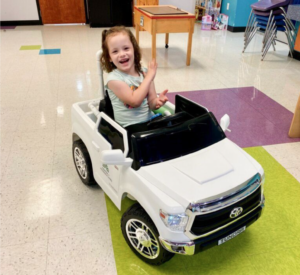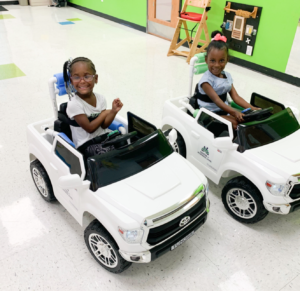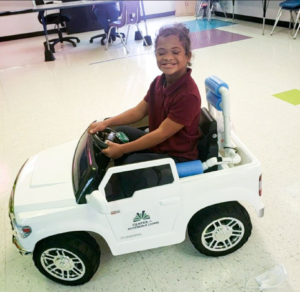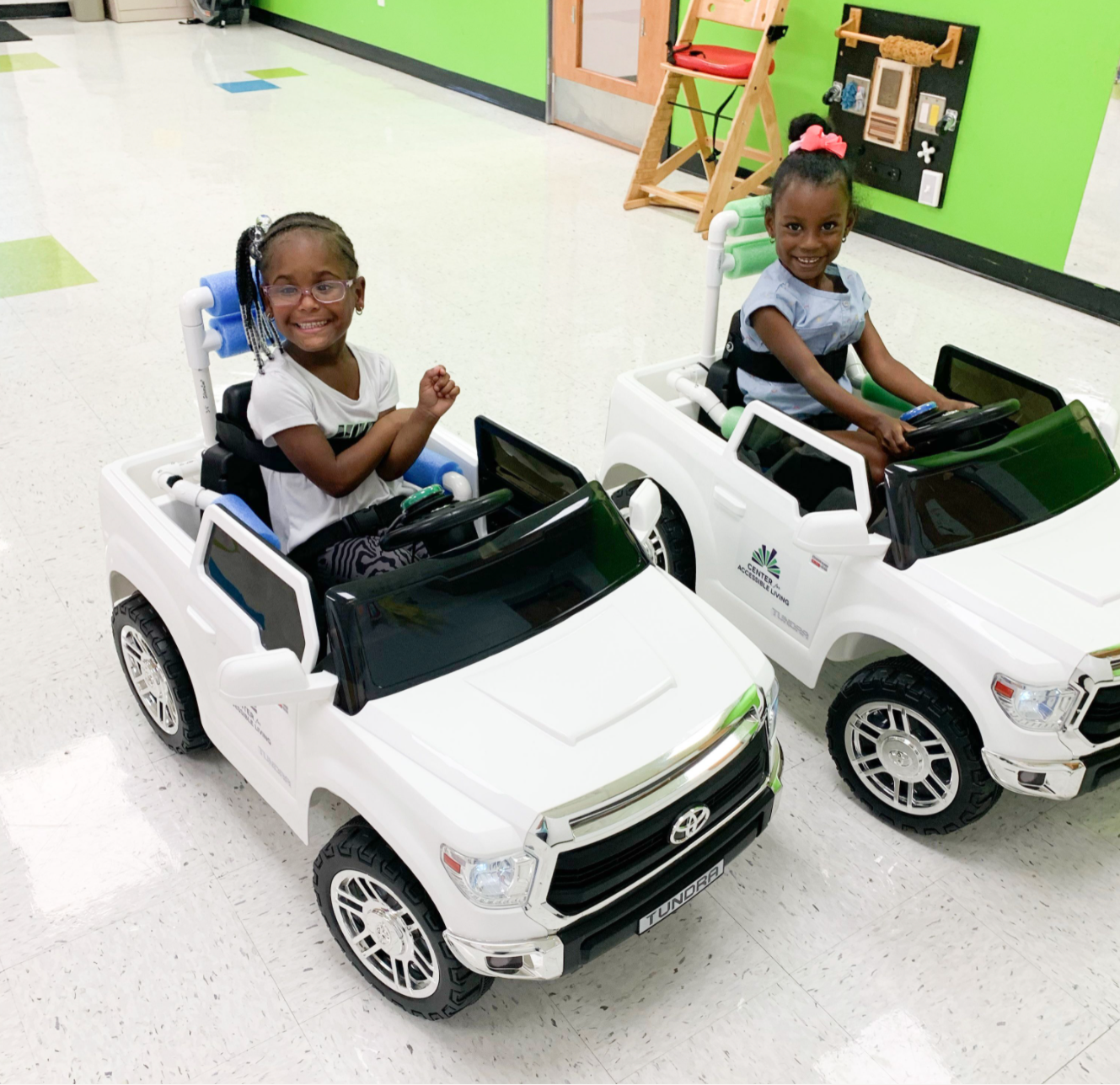Kid Powered
Go Baby Go Program Comes to Louisville
Writer / Dave Matheis
Photography Provided
At The Kidz Club, an organization that provides high-quality day nursing care for children with complex medical issues, the kids love their electric-powered toy Toyota Tundra cars. Specially adapted for use by children with significant disabilities, the cars enable them to operate the vehicles safely and independently.
 An organization called Go Baby Go provided the cars. Go Baby Go is the brainchild of Dr. Cole Galloway, a professor of physical therapy at the University of Delaware. According to Andrina Sabet, a consultant with Go Baby Go, it all started 10 years ago. Galloway was doing research in using robotics to assist children with disabilities. His research was generating a lot of interest from parents who were clamoring for practical applications for their children. Knowing that robotics were too expensive for any such applications at the time, he began visiting toy stores for ideas on what he could adapt for use by children with significant disabilities.
An organization called Go Baby Go provided the cars. Go Baby Go is the brainchild of Dr. Cole Galloway, a professor of physical therapy at the University of Delaware. According to Andrina Sabet, a consultant with Go Baby Go, it all started 10 years ago. Galloway was doing research in using robotics to assist children with disabilities. His research was generating a lot of interest from parents who were clamoring for practical applications for their children. Knowing that robotics were too expensive for any such applications at the time, he began visiting toy stores for ideas on what he could adapt for use by children with significant disabilities.
What Galloway found was electric-powered, rideable toy cars. He could adapt them so a child would only have to press a big button off and on, install speed control so the cars couldn’t go too fast, and build a harness for small children who could not sit without support. Soon he had developed a series of workshops to teach groups to modify the cars out of the box on their own, then began to search for ways to engage communities in adapting cars. He called his project Go Baby Go.
Soon a loosely affiliated grassroots movement developed around the concept. Galloway, who believes every child has a right to mobility, provided everything, taught groups how to use the training materials and offered support when needed. To date, 150 Go Baby Go chapters have been developed all over the country and overseas.
The cars used at The Kidz Club in Louisville are the result of a significant effort by the Toyota Corporation. Toyota leaders host an annual exposition for 1,500 engineers from around the world at their plant in Georgetown. A Toyota staff member at the time, Amy Maddox, had heard about the Go Baby Go initiative and suggested to Ben Atkinson, assembly engineer at the plant, that adapting toy cars might be a good project to include in the 2020 Exposition. He, in turn, took the idea to a corporate vice president who approved the project in about 90 seconds. Toyota began planning the project with Go Baby Go in February of 2020.
Then COVID struck and the exposition was cancelled. Undaunted, Atkinson decided that he was still going to make the project work. He enlisted Steve Hitchcock, a quality engineer, to help push things forward. Atkinson credits Hitchcock with much of the success that followed. Hitchcock coordinated pilot teams of plant employees to improve the work instructions, applying their knowledge of the Toyota Production System. The company bought 100 electric-powered toy Toyota Tundras. Using training videos provided by Go Baby Go, the teams conducted virtual builds in September, October and December of 2020, and in January of 2021, viewing the videos through Zoom and often doing the work in their living rooms. Hitchcock directed the assembly effort. The 100 cars were all adapted by the end of February. The next step was distributing them so that kids could use them.
Even before the cars were adapted, Sabet was leading the effort to reach out to organizations and families in Kentucky who could use the cars. Schools in the state also helped identify families. By the time the 100 cars were ready, they had places to go. Ultimately, 35 went directly to families with disabled children, 62 went to organizations in the state, and Toyota retained the remaining three as emergency replacements.
A staff member at the Center for Accessible Living (CAL), a disability resource center with offices in Louisville, Murray and Bowling Green, saw a solicitation from Sabet for Kentucky organizations to request the cars produced by Toyota. CAL, founded in Louisville in 1982, has a nearly 40-year history of providing vital services to individuals with disabilities, but has not typically served young kids. CAL requested two of the cars. Go Baby Go offered nine. Arriving in late February, five of the cars were kept in Louisville, two went to Murray and two went to Bowling Green.
Once they had the cars, the CAL staff had to decide how they could use the cars effectively and for the greatest benefit. Executive Director Susan Tharpe decided it would be best to partner with organizations that were already serving the age group. The cars would be loaned on a long-term basis to the organizations. A search began for appropriate partners. To date, CAL has loaned Go Baby Go cars to The Kidz Club in Louisville and Bowling Green.
The Kidz Club provides day-care services to kids with medical needs at six locations – three in Louisville and one each in Northern Kentucky, Lexington and Bowling Green. The centers serve individuals with diabetes, severe respiratory issues, seizures, cerebral palsy and spina bifida, among other disabilities. Some kids may be on ventilators or have feeding tubes. The Kidz Club is staffed with nurses, nursing assistants and caregivers, and each location cares for about 50 kids every day.
 The Kidz Club is currently rotating two Toyota Tundra cars among the Louisville, Northern Kentucky and Lexington locations. The cars are moved to a different center each month. The Kidz Club in Bowling Green has access to the two cars at CAL’s office there.
The Kidz Club is currently rotating two Toyota Tundra cars among the Louisville, Northern Kentucky and Lexington locations. The cars are moved to a different center each month. The Kidz Club in Bowling Green has access to the two cars at CAL’s office there.
Amanda Kleier, community relations coordinator at The Kidz Club, says the cars fit perfectly into the agency’s mission “to let Kidz be kids.”
“The cars give our kids confidence,” she says. “The button adaptation is very helpful. It makes the kids feel like they are controlling the car themselves. Every time I see them in the cars it makes me smile. They are just so cute.”
Atkinson says Toyota leaders were so pleased with the involvement with Go Baby Go that they are expanding the effort. The Toyota legal team is setting up a nonprofit for Go Baby Go – something that had not been done until now. The company is also partnering to develop a website for the nonprofit. Toyota dealerships around the country are inquiring about becoming involved. Atkinson and Hitchcock are working with them to develop local, smaller teams to modify toy cars. So far, teams have been developed at dealerships in Ann Arbor, Cleveland and Cincinnati. Toyota leaders hope to involve STEM programs in middle schools and high schools in adapting Go Baby Go cars, and have also been in talks with the engineering department at Purdue University to incorporate Toyota production knowledge and expertise in further developing the Go Baby Go program.






